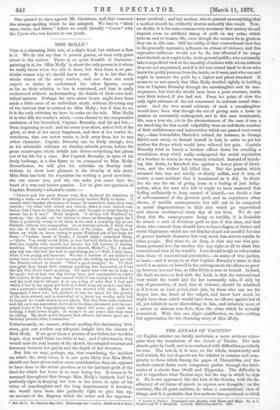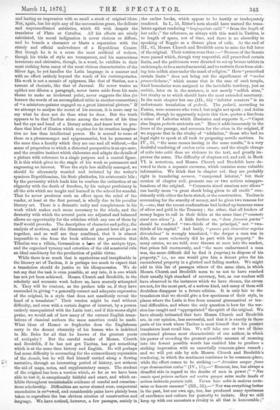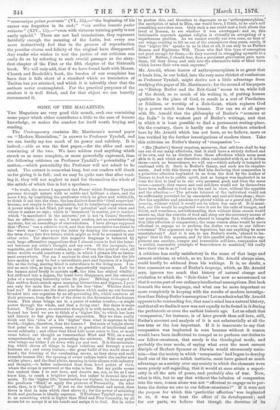THE ANNALS OF TACITUS.* AN English scholar can hardly undertake
a more arduous enter- prise than the translation of the Annals of Tacitus. The task stands quite by itself, and is encumbered with difficulties peculiarly its own. The text is, it is true, on the whole, trustworthy and well settled, the bet desperati are far inferior in number and com- plexity to those which throng the pages of Thucydides, and the student cannot desire more competent guides through the intri- cacies of a classic than Orelli and Nipperdey. The difficulty is not to reproduce what Tacitus says, but the way in which he says it. He is not oppressed, like the best of the Greeks, with the in- adequacy of set forms of speech to express new thoughts ; on the contrary, like all great satirists, he takes a conventional view of things, and it is probable that few authors have produced so vivid
• Annals of radius. Translated into English, with Notes and Maps. By A. J. Church and W. I. Brodrlbb. London: Macmillan and Co. 1876.
and lasting an impression with so small a stock of original ideas. Nor, again, has his style any of the unconscious grace, the delicate and unpremeditated subtleties, which fill with despair the translator of Plato or Catullus. All his effects are nicely calculated, his moral indignation is never riotous or diffuse, and he brands a character or blasts a reputation with the stately and official malevolence of a Republican Censor. But though he is in a sense the most artificial of writers, though his tricks of style are transparent, and his mannerisms inveterate and obtrusive, though, in a word, he exhibits in their most striking form many of the most vicious characteristics of the Silver Age, he yet handles the Latin language in a manner and with an effect entirely beyond the reach of his contemporaries. His work is not a mosaic of epigrams, like that of Statins, nor a torrent of rhetoric, like that of Juvenal. He never wastes an epithet nor dilutes a paragraph, never turns aside from his main theme to make an irrelevant point, never suggests the idea (to borrow the words of an accomplished critic in another connection) of "a miniature-painter engaged on a great historical picture." If we attempt to analyse the secret of his success, it is more easy to say what he does not do than what he does. But the truth appears to be that Tacitus alone among the writers of his time had the eye and hand of a literary artist, and knew how to pro- duce that kind of illusion which requires for its creation imagina- tive no less than intellectual power. He is second to none of them as a phrasemonger and epigrammatist, but he possesses at the same time a faculty which they are one and all without,—the sense of proportion to which a distorted perspective is an eye-sore, and the creative instinct which elaborates and adapts the details of a picture with reference to a single purpose and a central figure. It is this which gives to the staple of his work so permanent and engrossing an interest. Were the style less skilfully managed, we should be alternately wearied and irritated by the writer's spurious Republicanism, his Stoic platitudes, his aristocratic bile ; by the perversity which leads him to confuse the extinction, of an oligarchy with the death of freedom, by his unique proficiency in all the arts which are taught and learned in the school for scandal. That he never produces such an effect upon the mind of the reader, at least at the first perusal, is wholly due to his peculiar literary art. There is a dramatic unity and completeness in his work which makes each scene necessary to the whole, and the dexterity with which the several parts are adjusted and balanced allows no opportunity for the criticism which any one of them by itself would provoke. The description of character and policy, the analysis of motives, and the illustration of general laws all go on together, and so well are they combined, that it is almost impossible to rise from the book without the persuasion that Tiberius was a villain, Germanicus a hare of the antique type, and the organised tyranny and extortion of the old senatorial rule an ideal machinery for the production of public virtue.
While there is so much that is mysterious and inexplicable in the literary art of Tacitus, it is perhaps too much to expect that a translation should do justice to his idiosyncrasies. We do not say that the task is even possible, at any rate, it is one which has not yet been achieved. Messrs. Church and Brodribb, in the scholarly and accurate work before us, have scarcely attempted it. They will be content, as the preface tells us, if they have succeeded in giving " a generally correct and adequate expression of the original, in a style that does not manifestly reveal the hand of a translator." Their version might be read without difficulty, and even with a certain degree of interest, by a person entirely unacquainted with the Latin text; and if this seems slight praise, we would ask of how many of the current English trans- lations of classical authors the same assertion could be made. What ideas of Homer or Sophocles does the Englishman carry in the decent obscurity of his bosom who is indebted to Mr. Bohn for all that he knows of the greatest poets of antiquity ? But the careful reader of Messrs. Church and Brodribb, if he has not got Tacitus, has got something which is at the same time history and English. He will perhaps feel some difficulty in accounting for the extraordinary reputation of the Annals, but he will find himself carried along a flowing narrative, through an interesting period of history, not without the aid of maps, notes, and supplementary essays. The student of the original has here a version which, so far as we have been able to test it, is exceptionally faithful and exact, and which ex- hibits throughout unmistakable evidence of careful and conscien- tious scholarship. Difficulties are never slurred over, conjectural emendation is eschewed, and considerable pains have plainly been taken to reproduce the less obvious niceties of construction and language. We have noticed, however, a few passages, mainly in the earlier books, which appear to be hastily or inadequately rendered. In L, 53, Ritter's note should have warned the trans- lators against rendering "longinguitate exilii" "from the length of her exile ;" the reference, as always with this word in Tacitus, is to length of space, not of time, and there is no absurdity in speaking of Reggio as a distant place of exile. At the end of
III., 63, Messrs. Church and Brodribb seem to miss the full force- of the original. Their version runs thus :—" Decrees of the Senate were passed which, though very respectful, still prescribed certain limits, and the petitioners were directed to set up bronze tablets in. each temple, to be a sacred memorial, and to restrain them from sink- ing into selfish aims under the mask of religion." Here "prescribed certain limits" does not bring out the significance of "modes praescribebatur," which means that in the case of each temple, fixed boundaries were assigned to the inviolable territory, just as ambillo, later on in the sentence, is not merely " selfish aims," but rivalry as to which should have the most extended sanctuary. In the next chapter but one (HI., 65) " inferior senators " is an unfortunate translation of pedarii. The pedarii, according to. Festus, were senators who voted, but might not speak ; and Aulus. Genius, though he apparently rejects this view, quotes a line from, a mime of Laberius which illustrates and supports it,—" Caput sine lingua pedaria sententia est." Here it adds immensely to the force of the passage, and accounts for the eliam in the original, if we suppose that in the rivalry of "adulation," those who had no legal right to speak at all took to proposing servile motions. In.
IV., 33, " the same causes issuing in the same results," is a very doubtful rendering of easdem exitu causas, and the simple change of exitu into midi does no violence to the text, and greatly im- proves the sense. The difficulty of chapters xvi. and xvii. in Book. VI. is notorious, and Messrs. Church and Brodribb have de- voted to them a separate excursus, which contains some valuable information. We think that in chapter xvi. they are probably right in translating versura, "compound interest," but their version of chapter xvii. presents one or two serious misappre- hensions of the original. " Commoto simul omnium aere aliens'" can hardly mean "a great shock being given to all credit" con- sistently with either the facts stated, or the construction. Tacitus is for the scarcity of money, and he gives two reasons for it,—one, that the recent confiscations had locked up immense sums of silver and gold in the Treasury ; the other, that all lenders of money began to call in their debts at the same time ("cammoto simul aere alieno"). A little further on, "ducts foenoris parks"- should be rendered " two-thirds of the principal," not " two- thirds of his capital." And lastly, "panto quis obaeratior aegrius distrahebant" is wrongly translated, " the deeper a man was in debt, the more reluctantly did he part with his property." So. many estates, we are told, were thrown at once into the market, that prices fell enormously, and "the more embarrassed a man was, the more difficult did he find it (aegrius) to dispose of his. property," i.e., no one would give him a decent price for his encumbered property in a glutted and falling market. We might add to this list of passages others of the same class, in which Messrs. Church and Brodribb seem to us not to have reached their usually high standard of accuracy, but, as our readers will have observed in the instances which we have chosen, the errors are not, for the most part, of a serious kind, and many of them will doubtless disappear in a future edition. It is only fair to the translators that we should give a few specimens of their style, in places where the Latin is free from unusual grammatical or tex tual difficulties, and where the only question is how far the ver- sion has caught and "appropriated" the spirit of the original. We have already intimated that here Messrs. Church and Brodribb are, in our opinion, less successful, and that it is exactly in those- parts of his work where Tacitus is most himself that his present translators least recall him. We will take one or two of those condensed phrases most characteristic of our author, in which his power of crowding the greatest possible amount of meaning into the fewest possible words has enabled him to produce a striking impression with an essentially common-place remark ; and we will put side by side Messrs. Church and Brodribb's rendering, in which the sentiment continues to be common-place,. while the effect ceases to be striking :—" Atrociore semper fames erga dominantium exitus" (IV., 11),—" Rumour, too, has always a dreadful side in regard to the deaths of men in power ;" "Nee mania aput priores meliora sed nostra quoque aelas multa laudis et artium imitanda posteris lull& Verum haec nobis in maiores certa-
mina ex honesto maneant" 55),—" Nor was everything better in the past, but our own age, too, has produced many specimens of excellence and culture for posterity to imitate. May we still keep up with our ancestors a rivalry in all that is honourable ;"
" cesseruntgue prima poslremis" (VI., 32),—" the beginning of his career was forgotten in its end;" "viz artibus honestis pudor retinetur" (XIV., 15),—" even with virtuous training purity is not easily upheld." These are not bad translations, they represent faithfully enough the meaning of the Latin, but every one must instinctively feel that in the process of reproduction the peculiar charm and felicity of the original have disappeared. Any reader who wishes to test the justice of our criticism can easily do so by referring to such crucial passages as the sixty- first chapter of the First or the fifth chapter of the Sixteenth book. We will only add, that if we have found fault with Messrs. 'Church and Brodribb's book, the burden of our complaint has been that it falls short of a standard which no translation of Tacitus has yet attained, and which it is tolerably clear that the authors never contemplated. For the practical purposes of the student it is well fitted, and for that object we can heartily recommend it.




































 Previous page
Previous page